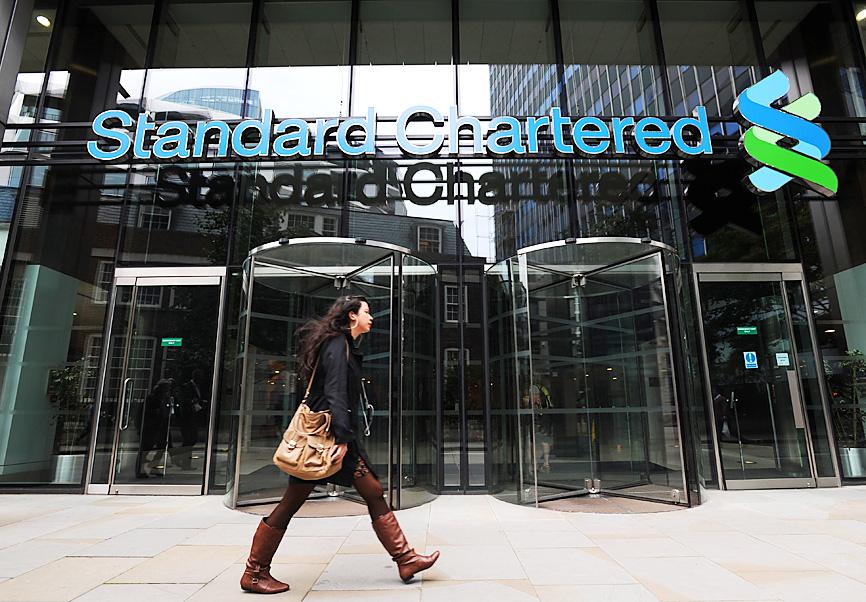Standard Chartered PLC plans to formalize a hybrid working model for most of its British staff this week as it moves forward with a sweeping overhaul of its working practices in the wake of the COVID-19 pandemic.
The lender is rolling out the program to its 85,000 staff globally after 84 percent of the first wave of workers asked to keep the flexible arrangements pioneered during the pandemic, which has forced millions of people worldwide to abandon offices and fit working hours alongside other commitments.
The bank’s new setup, first unveiled in November last year, takes effect from Thursday.

Photo: EPA-EFE
Standard Chartered is also exploring ways to help employees stay in touch under the new arrangement, with an internal competition among staff coming up with ideas including a holographic watercooler to help spark virtual conversations.
Tanuj Kapilashrami, group head of human resources, said in an interview that most employees are keen to work from home at least once a week, while others want more say in when they work.
“We really wanted to design the future based on what our employees want,” she said.
Most staff said they want to work at home some of the time, which “was a key part of the insight that shaped our thinking on hybrid,” Kapilashrami said.
The lender is reviewing its office network in light of the reduced need for space.
Speaking to Bloomberg last month, Standard Chartered chief financial officer Andy Halford said the company is estimating annual savings of about US$100 million from cutting the amount of office space it uses and would review all of its major sites, including its London base.
“We’ve got nine floors or 10 floors in a building in London; whether ultimately we could have seven of those, whether actually we could sublet part of that, those are the sorts of things we should look at,” Halford said.
Standard Chartered’s internal “watercooler challenge” has produced a shortlist of potential projects to keep staff in touch outside the office. The holographic meeting idea proposes matching staff using similar technology to dating services.
Other suggestions include an app called SCBilly that would link employees that live close to one another for social events, and a system called Coffee Meet to connect staff who want to talk to someone.
“People can pitch ideas and the ideas will get some seed funding to develop them,” Kapilashrami said. “We are working with the individuals who have given them to flesh them out.”

WEAKER ACTIVITY: The sharpest deterioration was seen in the electronics and optical components sector, with the production index falling 13.2 points to 44.5 Taiwan’s manufacturing sector last month contracted for a second consecutive month, with the purchasing managers’ index (PMI) slipping to 48, reflecting ongoing caution over trade uncertainties, the Chung-Hua Institution for Economic Research (CIER, 中華經濟研究院) said yesterday. The decline reflects growing caution among companies amid uncertainty surrounding US tariffs, semiconductor duties and automotive import levies, and it is also likely linked to fading front-loading activity, CIER president Lien Hsien-ming (連賢明) said. “Some clients have started shifting orders to Southeast Asian countries where tariff regimes are already clear,” Lien told a news conference. Firms across the supply chain are also lowering stock levels to mitigate

NEW PRODUCTS: MediaTek plans to roll out new products this quarter, including a flagship mobile phone chip and a GB10 chip that it is codeveloping with Nvidia Corp MediaTek Inc (聯發科) yesterday projected that revenue this quarter would dip by 7 to 13 percent to between NT$130.1 billion and NT$140 billion (US$4.38 billion and US$4.71 billion), compared with NT$150.37 billion last quarter, which it attributed to subdued front-loading demand and unfavorable foreign exchange rates. The Hsinchu-based chip designer said that the forecast factored in the negative effects of an estimated 6 percent appreciation of the New Taiwan dollar against the greenback. “As some demand has been pulled into the first half of the year and resulted in a different quarterly pattern, we expect the third quarter revenue to decline sequentially,”

Six Taiwanese companies, including contract chipmaker Taiwan Semiconductor Manufacturing Co. (TSMC), made the 2025 Fortune Global 500 list of the world’s largest firms by revenue. In a report published by New York-based Fortune magazine on Tuesday, Hon Hai Precision Industry Co. (better known as Foxconn) ranked highest among Taiwanese firms, placing 28th with revenue of US$213.69 billion. Up 60 spots from last year, TSMC rose 60 places to reach No. 126 with US$90.16 billion in revenue, followed by Quanta Computer Inc. at 348th, Pegatron Corp. at 461st, CPC Corp., Taiwan at 494th and Wistron Corp. at 496th. According to Fortune, the world’s

DIVERSIFYING: Taiwanese investors are reassessing their preference for US dollar assets and moving toward Europe amid a global shift away from the greenback Taiwanese investors are reassessing their long-held preference for US-dollar assets, shifting their bets to Europe in the latest move by global investors away from the greenback. Taiwanese funds holding European assets have seen an influx of investments recently, pushing their combined value to NT$13.7 billion (US$461 million) as of the end of last month, the highest since 2019, according to data compiled by Bloomberg. Over the first half of this year, Taiwanese investors have also poured NT$14.1 billion into Europe-focused funds based overseas, bringing total assets up to NT$134.8 billion, according to data from the Securities Investment Trust and Consulting Association (SITCA),